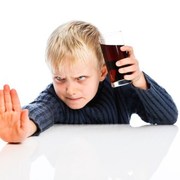 Photo: Getty Images
Photo: Getty Images
When I was growing up, my parents only allowed my brothers and me to drink soda on the weekends. At the time, I was under the impression it was some national law or cardinal sin to drink soda during the week.
Any time a friend would suggest I have a soda on a weekday (as most kids do), I respectfully declined and said I wasn’t allowed. They looked at me as if I had two heads. I glared back at them in the exact same way.
As the years have passed and I’m now in charge of making my own decisions about what I put in my body on a daily basis, I’m ever so grateful my parents were strict on our soda consumption as kids. It’s loaded with calories, decays your teeth, causes bone weakening and dehydrates the body among other unhealthy side effects.
Besides the toll soda takes on your health, a team or researchers from the University of Vermont in Burlington recently found soda consumption may affect your mood, too.
In a study is published in the Oct. 24 online issue of Injury Prevention, the team found that teens who drink a lot of soda seem to be prone to violence.
The researchers surveyed 1,900 Boston public high school students on how many non-diet sodas they drank during the last week, as well as whether they carried a weapon or had been violent toward family members or peers.
“Nearly 43 percent of teens who drank 14 or more cans of soda a week said they carried a weapon at some point, compared with 23 percent of teens who drank less than one can of soda a week,” according to a release on the study.
“And 59 percent of those drinking 14 or more cans a week had been violent toward peers, compared with 35 percent of those drinking one can or less. Teens who drank lots of soda were also more likely to be aggressive toward a sibling -- 45 percent compared with 25 percent among teens who drank little soda.”
The authors cannot be certain soda consumption was in any way related to an increase in violence among teens, as the researchers were unable to control for a number of factors including gender, race and tobacco and alcohol use. They were, however, able to control other important factors that could affect the likelihood of violence, such as quality of parenting and poverty.
Researchers said it’s possible that the association is explained by the soda itself, because “teens who drink lots of soda could be missing important micro-nutrients found in healthier foods ... or could be drinking soda to combat low blood sugar, which is linked to irritability or violence,” the release stated.
The high schoolers in the study who reported drinking a lot of soda were also more likely to have used alcohol or smoked cigarettes. Researchers believe large quantities of soda consumption could be a reflection that they’re doing other unhealthy things and that they don’t have a great upbringing.
So if you are the type of parents who lets your children drink soda during the week (as I presume, most parents do) this study offers another reason to consider easing your children off soda.
Sources:
Soft drinks linked to violent tendencies in teens. HealthDay. Web. 24 Oct. 2011. http://consumer.healthday.com/Article.asp?AID=658176
8 ways Soda fizzles your health. Water for Life USA. Web. 25 Oct. 2011. http://waterforlifeusa.com/blog/8-ways-soda-fizzles-your-health
Teen Violence. MedlinePlus. Web. 24 Oct. 2011. http://www.nlm.nih.gov/medlineplus/teenviolence.html
Bailey Mosier is a freelance journalist living in Orlando, Florida. She received a Masters of Journalism from Arizona State University, played D-I golf, has been editor of a Scottsdale-based golf magazine and currently contributes to GolfChannel.com. She aims to live an active, healthy lifestyle full of sunshine and smiles.
Reviewed October 25, 2011
by Michele Blacksberg RN
Edited by Jody Smith






Add a CommentComments
There are no comments yet. Be the first one and get the conversation started!